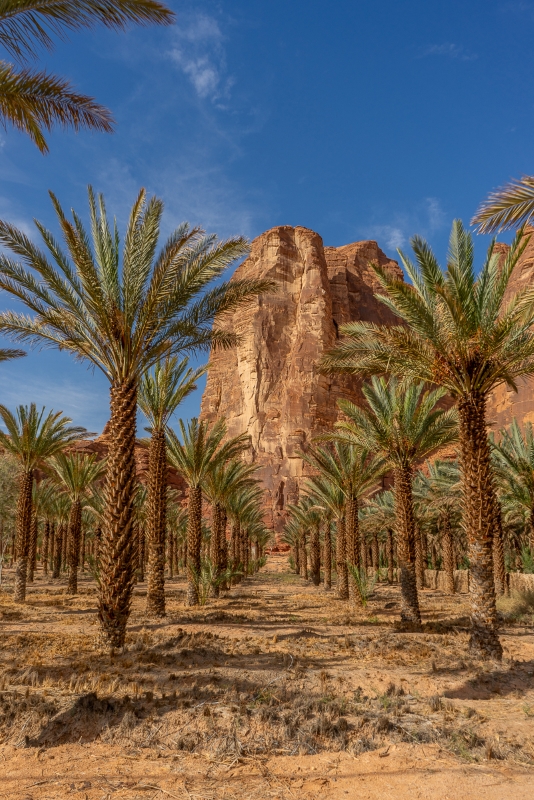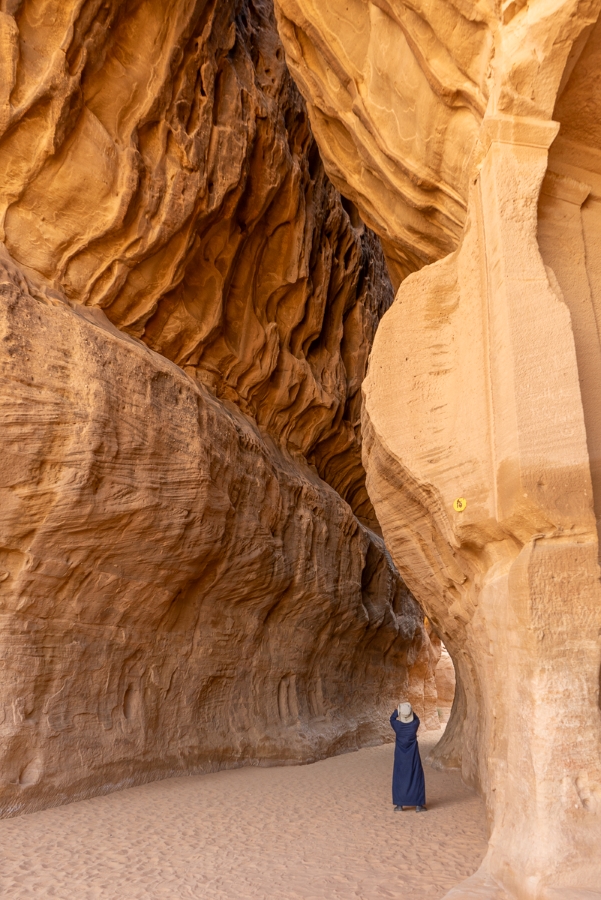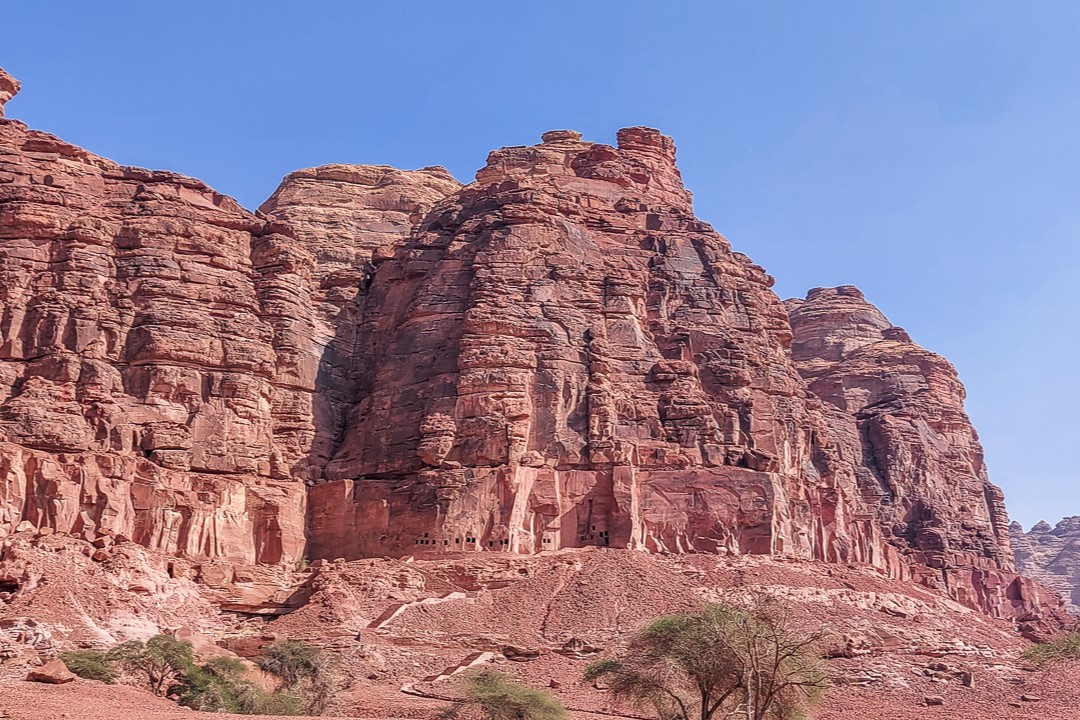


Visit Al Ula in Saudi Arabia before it’s too late
Al Ula is between dramatic rock formations and dunes northwest of Saudi Arabia. In the old town of Al Ula, one can wander for hours on sandy paths in a labyrinth of mud houses between thousands of palm trees. It is not without reason that it is a UNESCO World Heritage Site, an oasis at the crossroads of millennia-old caravan routes. It is the southernmost city of the Nabataean kingdom, famous for its spectacular rock-cut tombs.
Accessibility of Al Ula
If there is one place you should see during a visit to Saudi Arabia, it is Al Ula. If feasible, visit the site as soon as possible, given the enormous construction work during our stay in November 2023. We still had many of the sights to ourselves. That will undoubtedly change within a few years as Al Ula prepares for millions of visitors yearly. The infrastructure is ready to receive vast numbers of visitors: large four-lane highways lead from Medina, Al Wajh, Hail, and Tabuk to the town. Al Ula has an airport. Hotels are being built at a rapid pace. The old centre is under renovation.

Sightseeing in Al Ula
We spent a week there, but it could easily have been more. The sights we saw are listed below. There is more to see and do. You can climb, cycle, sleep and hike in the desert.
Hegra is the Petra of Saudi Arabia
Hegra and Al Ula are at the crossroads of the ancient caravan routes from Yemen and Oman to Syria, Jordan, and Turkey. More than two thousand years ago, the Nabataeans carved over a hundred tombs into the rocks in a magnificent desert landscape. The tombs are comparable to those of Petra in Jordan but, for now, without the hordes of tourists.
The graves were made for dignitaries such as healers, soldiers and local leaders. This area is the first UNESCO World Heritage Site in Saudi Arabia. The site can only be seen on an organised trip. A ranger accompanies visitors to keep them in line. While a rawi, literally a storyteller, is the guide. A tour via ‘Experience Al Ula’ cost 75 riyals in November 2023. Board the bus at Winter Park, a central departure point for the sights. For an independent guided tour click here to check rates and availability.
Sharaan Nature Park
The Sharaan nature reserve comprises fifteen hundred square kilometres of red rocks, extensive dunes and valleys. Cathedrals, elephants, camels, arks, UFOs and other figures are formations carved into sandstone by nature. It is surprisingly green, with prickly trees, the Talha trees that resemble the acacia. We see different types of grass and an edible plant that Abdul Aziz, the guide, lets us taste. It looks like a watercress with a lemon flavour. Traces of snakes, cats and, unfortunately, people are visible in the shifting sand.
In passing, we collect plastic bottles and other waste, evidence that we are not alone in this desert even though it looks like it. The entrance is strictly guarded, yet people make a mess of it. It is depressing that in such a beautiful place, people can’t spend time here, climb on rocks, look for tracks and look at plants without leaving their traces. The nature reserve is fenced and gated; you must book a private tour to visit the park.

Be enchanted by the starry sky in Gharameel
Gharameel is one hundred kilometres north of Al Ula, far from the city lights. It is a vast desert area, still dark, without light pollution. Millions of stars are visible without telescopes, framed by jagged rock formations. At least when there is no full moon, like during our visit, it’s bizarre how much light the moon gives in complete darkness. Even shadows from our fingers are visible. Outlines of rock formations stand out black against the yellow sand as we eat in the moonlight. It’s so cold that I put on my winter coat. We are at a height of eleven hundred meters on a desert plateau.
Tales of the moon
A Saudi rawi describes the line of the sun, moon and stars. She talks about how nomads have used the starry sky as a compass for thousands of years. And how they used poetry to transmit their knowledge in poems since they could not take written sources with them on their travels. Her voice is poetic, musical and friendly. I’ve noticed that Saudis who speak fluent English are pleasant to listen to. Something in their version of Arabic must make their voices so beautiful.
Either drive to Gharameel by car. Alternatively, if you book a tour, you get a guide, eat under the stars, and have other tourists’ company.

Channel your inner archaeologist in Dadan
Another important historical attraction in Al Ula is the city of Dadan, the capital of the Dadan and Lihyan kingdoms. The city is located on an oasis in a valley. Danan dates back to the ninth century BC. The later kingdom of Lihyan existed from the fifth to the second century BC.
Over a dozen tombs carved into the red rock walls have already been discovered in Dadan. From a distance, these look like simple dark rectangles. Lion sculptures mark two of the most important graves. These rock tombs are located up to fifty meters above the ground, carved in a time before modern construction equipment.
You may also only visit Dadan under supervision. The departure by bus is also from Winter Park. The graves can only be seen from afar as archaeological excavations are still underway. We get five minutes to view the tombs from a great distance. Then, we are directed to a workshop where we can find our inner archaeologist and toddler. The teacher puts us to work in a sandbox with a shovel and a brush. After excavating an ‘antiquity’, a worksheet is ready to record the findings. Unfortunately, my paper is deemed insufficient for a sticker from the teacher.
Jabal Ikmah, an open-air library
The ‘open-air library’ at Jabal Ikmah is in a desert gorge. An impressive collection of inscriptions and petroglyphs—the most comprehensive in Saudi Arabia- can be seen here. The writings are in several languages and alphabets. These writings describe daily life, religious practices, social activities and laws. In addition, there are petroglyphs depicting animals, which are no longer found in this area.
For a guided tour click here to find out about rates and availability.

Sunset mocktail at Harrat’s viewpoint
Al Ula has numerous vantage points over its epic landscape. At the Harrat viewpoint, one stands in the black lava of Harrat Uwayrid. While in front stretches the Dadan Gorge, the Old Town of Al Ula, the Fort of Al Ula and the Oasis of Al Ula. This area is the Monument Valley of Saudi Arabia.
Walk along the edge of the gorge to get an impression of what a moonscape would look like. The 360-degree view over the red desert, the black of the lava, and the yellow and green of the oasis are otherworldly. Here, you are surrounded by gorges, front and back, with an oasis in the middle through which a gigantic river used to flow.
Hokto restaurant
At the tip of ‘our’ cliff sits Hokto restaurant, where you can enjoy a spectacularly expensive mocktail and pasta with a view. The ratio of staff to guests here is approximately one in ten. That means twenty people serving, not counting the kitchen staff, for every two guests (us).
Plan your visit for sunset after a hike over the ridge. Go on a tour by car or take a taxi—a taxi from the city costs about four euros.

Elephant Rock, a geological wonder
The 52-meter-high elephant rock sits in the desert on the edge of Al Ula. Wind and water erosion have formed the shape over millions of years. This monolithic sandstone formation, known in Arabic as Jabal AlFil, is at its best at sunset.
The rock is illuminated in the evening, with a musical wallpaper in the background. Kiosks sell coffee and nargile. You will also find a café and a simple restaurant that is open most of the year and serves food and drinks until late at night. Drive there or take a free bus from Winter Park. Entrance is free or take a tour.

Is Maraya a Fata Morgana?
Maraya is a gigantic mirror cube in the Ashar Valley in which the surrounding rock formations reflect. Maraya means ‘mirror’ or ‘reflection’ in Arabic. Maraya is also a theatre for well-heeled visitors. Cheb Khaled performed during our stay. The cheapest tickets were two hundred euros each.
Entrance to the valley is free. You can go there on a tour, in a taxi or car.
Al Ula UNESCO Historical Centre
In the old town of Al Ula, you end up in one of Sherazade’s tales of a thousand and one nights. The full moon illuminates mud dwellings with the mountains in the background. Men in white dishdasha walk hand in hand along the dirt roads, lie on mats on the floor or sit on clay benches covered with oversized cushions in the smell of incense whilst atmospheric music plays in the background. Subtle lighting illuminates the streets in a refined way. Even the Dunkin Donuts logo, American, after all, is hardly visible on the facade.
The town is fake, of course. The walls of the dwellings are reinforced with concrete, with a thin layer of clay spread over them. Not the entire neighbourhood is newly made. The core is old. On the other side of the busy main street through Al Ula is the oasis, where there is an authentic goat dung smell and remains of the real old mud houses.

Practical information
Flights
Al Ula Al Ula has its own airport.
For flight ticket options, look here.
Local transport
From Winter Park, buses go to most attractions. Some tours must be booked online in advance.
Taxis are a budget-friendly way of travelling. You can book these using apps such as Uber or local apps Careem or Kaiian. For the Saudi apps, you need a Saudi telephone number. It helps in traffic if you have some contempt for life. Seat belts are often disabled. The drivers use their mobile phones to translate, set the route, play games, make video calls and read their e-mail while driving. Overtaking takes place on all sides, over solid lines and the verge.
Rent a car
It is not necessary to rent a car. But with a car at your disposal, you are more flexible.
To rent a car, an international driver’s license is obligatory. You must arrange this before departure. Compare car rental prices here.
Accommodation in Al Ula
Al Ula is one of the most expensive places in Saudi Arabia. We stayed at Husaak Glamping, just outside the city, a beautiful place in an oasis. Unfortunately, it is next to a busy road. The swimming pool is just for show: ‘no swimming’. View the prices and availability of Husaak Glamping.
If you’re on a budget, get the complete desert experience at Cloud7, with mountain views and an outdoor pool about 27 miles from Madain Saleh ruins. View prices and availability of Cloud 7.
Bologna, more than a great university city
Bologna university city The University of Bologna was founded almost a thousand years ago, in the year 1088. The faculties of law, medicine, and natural sciences enjoy worldwide fame. Tourism Bologna For centuries, the capital of the Emilia-Romagna region has been a...
Valpolicella, more than wine
Valpolicella more than just wine Valpolicella, a region in Northern Italy, is ideally suited to enjoy la dolce vita. Preferably outside the high season, given the crowds who flock to this part of the world in the summer. Saying that, almost all places are more...
3 x snowshoeing in northern Italy
Snowshoeing The winter wonderland of northern Italy is a great place to relax. On the snow-covered mountains, life doesn't get much better. But while it is 20º C on New Year's Day in the Swiss alps (source), I wonder how long I can, in good conscience, continue with...
Istanbul at a crossroads between East and West
Istanbul, wow, what a city! Everything comes together in this metropolitan. Europe and Asia, East and West, Islam and Christianity.
Lesbos beyond the beaches
Lesbos, one of the biggest islands in Greece is a treasure trove of sightseeing, largely undiscovered by mass tourism.





